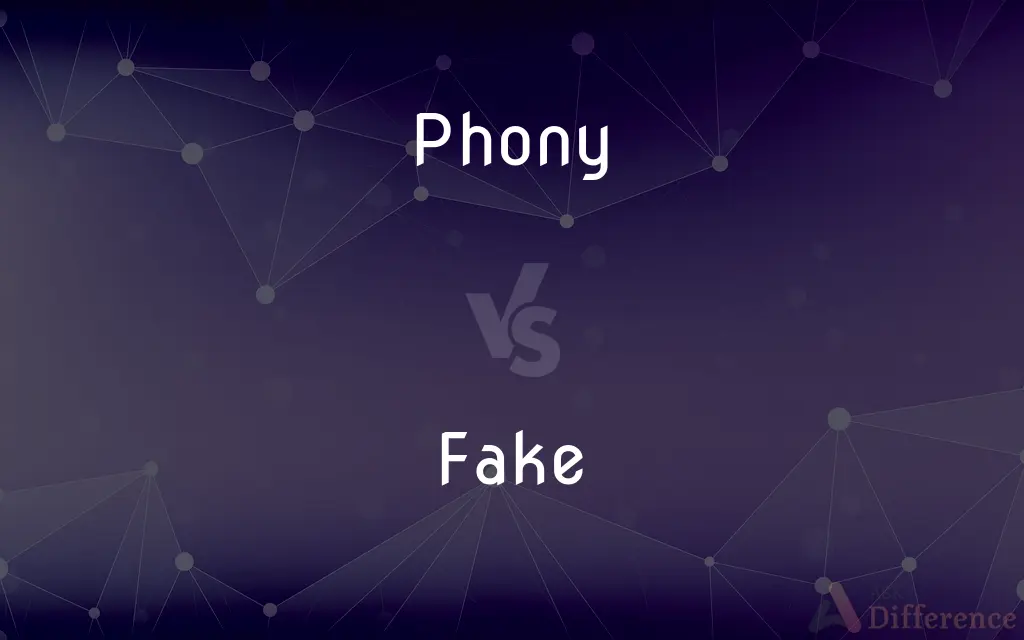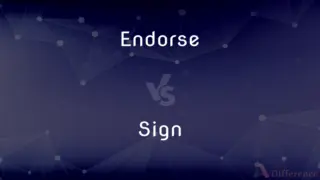Phony vs. Fake — What's the Difference?
Edited by Tayyaba Rehman — By Fiza Rafique — Updated on April 23, 2024
Phony refers to deceit or falsehood in character or behavior, while fake implies an imitation or counterfeit object.

Difference Between Phony and Fake
Table of Contents
ADVERTISEMENT
Key Differences
Phony often describes a person or behavior that is insincere or deceitful. For example, someone might act friendly for personal gain. Fake, on the other hand, typically refers to objects that are imitations or replicas, such as fake jewelry or a fake painting.
While "phony" suggests a lack of authenticity in personal demeanor or intentions, "fake" is used to describe material items that are not genuine but are made to appear so, like fake leather.
Phony can also imply an element of deliberate deception in emotional expressions or interactions, suggesting pretense in social situations. Conversely, fake deals more with the superficial appearance of physical items, highlighting their lack of authenticity.
When describing a phony attitude, the focus is on the deliberate misrepresentation of one’s true feelings or intentions. In contrast, describing something as fake emphasizes its creation to deceive by mimicking the appearance or qualities of something real.
"Phony" usually carries a negative connotation regarding personal characteristics or interactions, where deceit plays a central role. Whereas "fake" often focuses on the objective quality of items, categorizing them based on their authenticity or lack thereof.
ADVERTISEMENT
Comparison Chart
Part of Speech
Adjective
Adjective
Primary Usage
Describes deceit in behavior
Describes imitation in objects
Context
Personal traits, behaviors
Objects, materials
Example Phrase
He was being phony at the party
That painting is a fake
Connotation
Negative, deceitful
Negative, lacking authenticity
Compare with Definitions
Phony
Pertains to false representation of one's personality.
Her phony smile hid her real feelings.
Fake
Refers to objects made to imitate something valuable.
She bought a fake Rolex on vacation.
Phony
Often used to describe artificial interactions.
Their phony enthusiasm was obvious.
Fake
Used to describe artificial or synthetic materials.
Fake fur is often used in winter coats.
Phony
Describes deceitful or insincere behavior.
He gave a phony excuse for being late.
Fake
Often pertains to forgeries or copies.
The museum discovered the sculpture was a fake.
Phony
Can imply fraudulent or deceptive qualities.
Avoid those phony investment schemes.
Fake
Can refer to someone or something pretending to be what it is not.
He's a fake doctor, with no real degree.
Phony
Indicates a lack of genuineness in personal interactions.
His phony apology was not convincing.
Fake
Implies a creation intended to deceive.
The document was a fake and easily detected.
Phony
Not genuine or real; sham or counterfeit
A phony credit card.
A phony beard.
Fake
Not genuine; imitation or counterfeit
She got on the plane with a fake passport
A fake Cockney accent
Phony
Spurious, deceptive, or false
A phony excuse.
Fake
A thing that is not genuine; a forgery or sham
Fakes of Old Masters
Phony
Fraudulent, deceitful, or dishonest
A phony expert in investing.
Fake
Variant spelling of flake
Phony
A fraudulent or dishonest person.
Fake
Forge or counterfeit (something)
She faked her spouse's signature
Phony
Something that is not genuine; a fake.
Fake
Variant spelling of flake
Phony
(informal) Fraudulent; fake; having a misleading appearance.
A good jeweler should be able to tell a real stone from a phony one.
Fake
Having a false or misleading appearance; fraudulent.
Phony
(informal) A person who assumes an identity or quality other than their own.
He claims to be a doctor, but he's nothing but a fast-talking phony.
Fake
One that is not authentic or genuine; a sham.
Phony
(informal) A person who professes beliefs or opinions that they do not hold.
He's such a phony, he doesn't believe half of what he says.
Fake
(Sports) A brief feint or aborted change of direction intended to mislead one's opponent or the opposing team.
Phony
(informal) Anything fraudulent or fake.
Fake
One loop or winding of a coiled rope or cable.
Phony
(informal) To fake.
Fake
To contrive and present as genuine; counterfeit
Fake a signature.
Phony
Imitating something superior; intended to deceive; fraudulent; having a misleading appearance; not genuine; counterfeit; fake; as, a phony diamond; a phony hundred-dollar bill.
Fake
To simulate; feign
Faked his death so his wife would collect insurance money.
Phony
Pretending to be other than one is; putting on false appearances; insincere; hypocritical; - of people.
Fake
(Music) To improvise (a passage).
Phony
Something or someone that is phony.
Fake
(Sports) To deceive (an opponent) with a fake. Often used with out.
Phony
A person who professes beliefs and opinions that he does not hold
Fake
To engage in feigning, simulation, or other deceptive activity.
Phony
Fraudulent; having a misleading appearance
Fake
(Sports) To perform a fake.
Fake
To coil (a rope or cable).
Fake
Not real; false, fraudulent
Which fur coat looks fake?
Fake
(of people) Insincere
Fake
Something which is not genuine, or is presented fraudulently.
I suspect this passport is a fake.
Fake
(sports) A move meant to deceive an opposing player, used for gaining advantage for example when dribbling an opponent.
Fake
(archaic) A trick; a swindle
Fake
(nautical) One of the circles or windings of a cable or hawser, as it lies in a coil; a single turn or coil.
Fake
(transitive) To make a counterfeit, to counterfeit, to forge, to falsify.
Fake
(transitive) To make a false display of, to affect, to feign, to simulate.
To fake a marriage
To fake happiness
To fake a smile
Fake
(archaic) To cheat; to swindle; to steal; to rob.
Fake
(archaic) To modify fraudulently, so as to make an object appear better or other than it really is
Fake
To improvise, in jazz.
Fake
(nautical) To coil (a rope, line, or hawser), by winding alternately in opposite directions, in layers usually of zigzag or figure of eight form, to prevent twisting when running out.
Fake
One of the circles or windings of a cable or hawser, as it lies in a coil; a single turn or coil.
Fake
A trick; a swindle.
Fake
To coil (a rope, line, or hawser), by winding alternately in opposite directions, in layers usually of zigzag or figure of eight form,, to prevent twisting when running out.
Fake
To cheat; to swindle; to steal; to rob.
Fake
To make; to construct; to do.
Fake
To manipulate fraudulently, so as to make an object appear better or other than it really is; as, to fake a bulldog, by burning his upper lip and thus artificially shortening it.
Fake
Something that is a counterfeit; not what it seems to be
Fake
A person who makes deceitful pretenses
Fake
(football) a deceptive move made by a football player
Fake
Make a copy of with the intent to deceive;
He faked the signature
They counterfeited dollar bills
She forged a Green Card
Fake
Fake or falsify;
Fudge the figures
Cook the books
Falsify the data
Fake
Talk through one's hat;
The politician was not well prepared for the debate and faked it
Fake
Fraudulent; having a misleading appearance
Fake
Not genuine or real; being an imitation of the genuine article;
It isn't fake anything; it's real synthetic fur
Faux pearls
False teeth
Decorated with imitation palm leaves
A purse of simulated alligator hide
Common Curiosities
Is "phony" always negative?
Yes, "phony" carries a negative connotation, implying deceit and insincerity.
How can you identify a "fake" item?
Fake items can often be identified by poor craftsmanship, incorrect branding, or materials that feel off.
Is it easier to detect "phony" behavior or "fake" items?
It depends on the context and the observer's expertise, but generally, fake items might be easier to detect through physical examination.
What types of items are commonly labeled as "fake"?
Common fake items include jewelry, documents, and designer goods.
What is the origin of the term "phony"?
"Phony" originated from early 20th-century slang, possibly derived from "fawney," which referred to a gilt ring used in a swindle.
Can "phony" apply to objects?
Rarely, as "phony" typically describes behaviors or traits rather than material qualities.
What are the ethical implications of using "phony" behavior?
Phony behavior can erode trust and damage relationships, leading to negative social consequences.
How does "phony" primarily differ from "fake" in usage?
"Phony" is used to describe deceptive behaviors or personalities, while "fake" often refers to counterfeit items.
Are there situations where "fake" items are legally acceptable?
Yes, such as in the case of replica fashion items clearly labeled as such, without intent to deceive.
Can "fake" also describe behavior?
Yes, someone can act "fake," meaning they are insincere or pretending in their behavior.
Share Your Discovery

Previous Comparison
Cream vs. Beige
Next Comparison
Endorse vs. SignAuthor Spotlight
Written by
Fiza RafiqueFiza Rafique is a skilled content writer at AskDifference.com, where she meticulously refines and enhances written pieces. Drawing from her vast editorial expertise, Fiza ensures clarity, accuracy, and precision in every article. Passionate about language, she continually seeks to elevate the quality of content for readers worldwide.
Edited by
Tayyaba RehmanTayyaba Rehman is a distinguished writer, currently serving as a primary contributor to askdifference.com. As a researcher in semantics and etymology, Tayyaba's passion for the complexity of languages and their distinctions has found a perfect home on the platform. Tayyaba delves into the intricacies of language, distinguishing between commonly confused words and phrases, thereby providing clarity for readers worldwide.














































